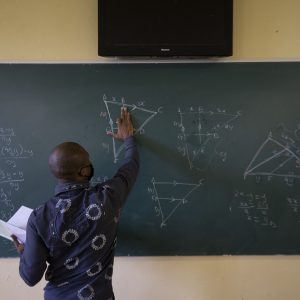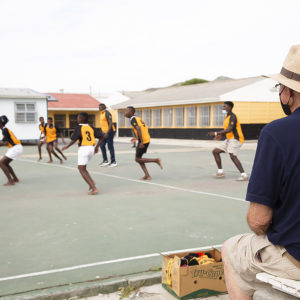Making maths fashionable, the Mthethwamatics way
Mathematics education is in a dismal state, but one non-profit aims to improve access to the subject for teachers and learners – and by extension South Africa’s performance in the subject.
Author:
28 September 2021

Simo Mthethwa, a lecturer at the University of KwaZulu-Natal, has designed an innovative and accessible programme for teaching and learning mathematics at primary and high school levels. He aims to improve how South Africa’s students fare when pitted against their counterparts from better-performing countries.
Mthethwa has always been passionate about maths and has a PhD in the subject. His programme – he registered Mthethwamatics as a non-profit organisation early this year – is an extension of his passion for the study of numbers, shapes and more.
Related article:
“The name Mthethwamatics is a combination of my surname and mathematics. This name, on its own, is an attempt at removing the mathematics phobia and making it resonate with the African people,” he says.
He comes from eSabhuza village in Empangeni, on the north coast of KwaZulu-Natal, and his interest in numbers is lifelong, from school to academia. “Mathematics is what I do for a living, my everyday life. I teach it and research it.”
An idea now in full steam
While studying for his master’s degree in 2014, Mthethwa ran tutoring programmes and workshops for teachers in his area. He realised there was a gap between teachers and learners and decided to create Mthethwamatics in 2016, which now has members from across the country. Anyone – parents, learners, teachers – can join the classes or mailing list.
Sihawukele Mdletshe, 14, from Empangeni and Kagiso Boitumelo Mohulatsi, 17, from Lichtenburg in North West province are Mthethwamatics students.
Mdletshe, a grade 9 learner at Mningi High School, has been enrolled with Mthethwamatics for the past six months. She struggled with graphs and factorising algebraic expressions before joining the programme, she says. It was only after attending the Teach the Nation online classes that her understanding of the subject improved. “They are so understanding and patient, which is what a learner needs,” Mdletshe says.
Related article:
Mohulatsi first saw Mthethwamatics on Facebook. Right away, he wanted to know more. “I was inspired to see young people participating in the Virtual Maths Competition and … to see Dr Simo Mthethwa making a huge difference trying to break the stigma people have [of] mathematics. I also wanted to be part of the family,” he says.
Mohulatsi joined the programme early this year. He had been struggling with mathematical concepts for a long time, but he has improved now and is grateful to Mthethwa. He takes part in online classes over the weekends, but Mohulatsi says he assists him any time he has a query.
Mohulatsi appreciates the relatable examples Mthethwamatics gives, as well as having access to several maths teachers, unlike at school where it’s only the assigned teacher. “I love how various teachers simplify the concepts, making it easier for the learners to understand,” he says. Mohulatsi is a grade 12 learner at High School Coligny.
Spreading the love of maths
Helping Mthethwa make maths accessible and fun is Andrew Falatsi Khomo, 21, a student at the University of the Witwatersrand. He is a final-year BSc student majoring in physics, astronomy and astrophysics, and the president of the Wits Astronomy Club. Mthethwa “doesn’t know I am one of those he inspires”, says Khomo, who teaches at Mthethwamatics.
Some of the misconceptions about maths are that it is difficult, an annoying subject, does not apply in real life and there are no jobs in the field, he says. He is happy Mthethwamatics is changing these misconceptions.
Related article:
Mthethwamatics teaches through creation and engagement, according to Khomo. To grab learners’ attention, the programme runs competitions with prizes. The approach is to teach maths through practice and engagement.
A dedicated team
Another passionate maths teacher is Thami Vezi, 29, from Umlazi in KwaZulu-Natal. He has taught grades 10, 11 and 12 at Inanda Seminary High School for the past five years and has been part of the Mthethwamatics programme for a year.
“I am continuously looking for a variety of ways of engaging learners in mathematics. Mthethwamatics’ vision of making mathematics fashionable merged very well with my very own interest in the development of interest among learners,” Vezi says.
By taking part in Mthethwamatics, Vezi learned to use games to enhance teaching and learning. He says he appreciates the continuous collaboration with other facilitators of the programme.
Vezi lists the reasons why educators struggle to teach maths. “Language barrier: mathematics textbooks are generally in English, which poses an impediment for those with little English experience. Stigma: there is a very dominant societal stigma attached to the subject. Lack of basic knowledge and logic such as basic number operations,” he says.
Related article:
Learners struggle as much as teachers when it comes to language, says Vezi. They become demotivated and lose interest because the material being in English makes it inaccessible for many. This is compounded by the language of maths itself and, for many learners in South Africa, this is a major barrier.
A poor performance in maths is inevitable for many from a young age because of “poor fundamentals from primary school level”. This is made worse by “content knowledge deficit from educators”.
Joining Mthethwamatics improves his teaching in the physical classroom. “The sharing of ideas among different teachers or facilitators from different walks of life allows teachers to vary their approaches,” says Vezi.
There needs to be an emphasis on ensuring that the classroom is driven by learners and centred on them, he adds. Lessons should not merely cover the syllabus, they should also build skills.
Fresh approach
Mthethwa says his approach is to define, relate, recall and solidify. “Define a concept mathematically. Relate it by providing examples of what it could capture on a day-to-day basis, or relate it to other concepts. Recall the actual definition to maintain precision. Solidify by providing [examples of] usefulness.
“To overcome the ‘mathematics does not have jobs’ [thinking], we invite mathematicians and other professionals associated with mathematics from various sectors to share with learners, teachers and the community about their careers,” says the founder. This falls under two programmes called Careers In Mathematics and Research In Mathematics, both of which try to address misconceptions about the subject.”
Related article:
The programme’s Virtual Mathematics Competition “aims to educate society about some principles, fundamental concepts and theorems in mathematics, as well as knowledge about local and international mathematicians,” says Mthethwa. The competition is open to everyone.
The Teach the Nation aspect of the programme provides advanced maths lessons for all students, from grade R to 12. Talented teachers, tutors and academics are invited to teach online, with lessons streamed live on Facebook and Instagram.
Khomo closes by saying maths is a universal language, and it’s fun. Mohulatsi agrees. He credits Mthethwamatics for his new-found enjoyment of the subject. And it is just the sort of thing Mthethwa was aiming for when he established the organisation in 2016.






